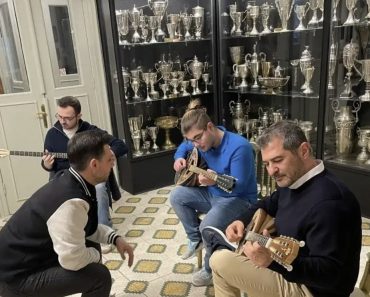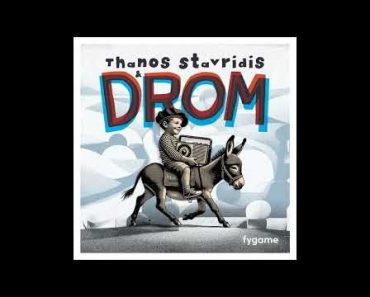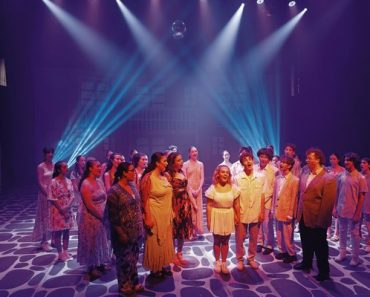By
·
April 09, 2025

Over the past three years, Stella Chronopoulou, aka Σtella, has become one of the biggest successes in the Greek indie pop scene. A visual artist by trade, she adopted the moniker over a decade ago while studying painting at the Athens School of Fine Arts, ostensibly as a side project. Fast forward to now, and she’s got a coveted Sub Pop deal, millions of monthly Spotify listeners a month, and multiple world tours on the books. Global fame is beckoning, and yet, the faster her star rises, the more determined she is to slow down and take it all in; to let the journey unfold as it may. And her new record Adagio is just that—a pastoral work inspired by her rural upbringing, composed in studios and on the ferry, which combines reworked traditional songs with originals sung in English and Greek.
The Odyssey, of course, is a Greek thing, and they’ve always played a crucial role in Greece’s creative destiny, both literally and figuratively. The geography and the accompanying reliance on (often slow-moving) ferries for transportation practically demands it. “If you’re Greek, you have a huge connection to the sea, and so I think a lot of people find the boat ride a really spiritual thing, because you can get lost,” Chronopoulou says. Killing time on one such occasion before the pandemic—”If you’re a musician, you’re probably going to write something while you’re on the boat,” she says—she cued up GarageBand on her iPhone; the end result was “Omorfo Mou,” one of the record’s lead singles.
The Mediterranean is but one component of the record’s backdrop; her hometown of Ano Glyfada, in the hills north of Athens, operates as both the foreground and a lynchpin of the album’s nostalgic themes. That area is largely gentrified now, but during her childhood in the ’80s and ’90s, it was effectively the boonies: a cultural desert with no venues or creative institutions, just a handful of tavernas. Her exposure to live music may have been limited, but she absorbed its traditions nevertheless, thanks to a strong musical education at home that spanned Greek music, American pop, and British rock. (To wit, the first two albums she purchased were by Whitney Houston and The Doors; she’s also big on Michael Jackson, Annie Lennox, and Nirvana, to name a few.) Drawing connections at a distance through a nostalgic, personal lens, her fusion is less about constructing a bridge than distilling that intergenerational ripple effect: “Growing up listening to a lot of Greek music from the ’40s and the ’50s and the ’60s through my grandparents, and then growing up to pop music that came from the U.S. and the UK—I didn’t even know what production sounded like back then, but everything sounded so mind-blowing.”
The follow-up to her Sub Pop breakthrough Up And Away, Adion isolates the Hellenic undertow that’s been guiding Σtella’s cosmopolitan pop all along; propping classic themes of love, nature, and wanderlust against a marbled Mediterranean backdrop, it marks her first work sung in her mother tongue in addition to English. The translation process wasn’t an easy task, mind you, given the variance between the two Romance language—one widely adopted and flexible, the other rigid and storied. Take “Σ’αγαπώ” (pronounced sah-gah-POH), which translates to “I love you.” A rolling, consonant-heavy triplet with a pointed emphasis on the last syllable, it’s a phrase as impassioned as it is blunt, its cadence more mic drop than serenade; the weighty structure, she explains, leaves little room for subtlety or creative distance. “English, for me, is lighter than saying stuff in Greek,” she says. “When I say stuff in Greek, there’s a certain heaviness to it, I think, because because there’s no distance between the music and the feeling.”
The only thing Σtella loves more than a catchy hook or a long ferry ride? Shouting out Greek artists from across all eras. And her list of recommendations has it all—Klepht troubadours behind the “mountain music” of the ’30s and ’40s, acclaimed contemporaries currently making waves in Athens, a DIY label focused on Greek and African music, and more. Here’s what she’s got on repeat as of late.
Kyriakos Sfetsas
Greek Fusion Orchestra Vol.2
“Taranga Beat is the label of a friend of mine, Adam Mardius; we studied together at the Athens School of Fine Arts. When he started, he released music mostly from Senegal and Africa, but he’s been discovering music from other places and Greece as well. Everything released on this record label is just a gem.”
bhukhurah
“Blue Platinum Beach”
“I knew bhukarah from around Athens, and I asked them last year to open one of my shows. It was great. His music makes me feel happy, and it’s all good vibes, you know?”
Tropical Geometry
Luck Mountain
“Tropical Geometry is my friend Bobby [Theocharis], who I’ve known for at least 15 years; we had a band together at some point when I was first starting to write music, and we had released one song. I really like that he’s made this album with a lot of vintage sounds—if you look it up on Bandcamp, at the bottom [of the page], he even mentions the synthesizers he used for this album. It’s a homemade album, a little gem: It makes me feel really soothed and nice when I’m listening to it. His voice is so warm; the vocals are amazing. Maybe I’m biased, but I do think Greek singers are on a whole different level. I mean, we’ve had a tradition of it for 1000s of years. And he sings beautifully—the whole thing is just so romantic and vintage but also contemporary, and I love it.”
Kitsos Harisiadis
Lament in a Deep Style 1929-1931
“I was completely shocked and so surprised when I realized that this music was on Third Man Records. I think most of them are from Epirus. It’s mountain music—music that goat herders would play at the top of the mountain—like, the mountains and the sky would listen to it. It gives me goosebumps, this music; it’s our tradition, and it’s just insane that it’s on Third Man Records. I’m not sure if people are realizing how amazing it is. At some point, I was looking through YouTube—nowadays, because people have phones, even the people that take their goats out, so there are a lot of recordings where you see this man singing in front of this whole mountain, and just the echoes and all that stuff is beautiful. A lot of that stuff is on YouTube nowadays.”
Johnny Labelle
Cold Fruit
“Johnny is a friend of mine who I once met at the Syros International Film Festival. I had I went there maybe five years ago to perform on the beach one night—it was really beautiful—and I think Johnny was one of the people working for the festival. When I met him, I never thought that the same person would transform later in his life into the Athenian crooner persona of Johnny LaBelle. I remember the first time I heard him sing, [thinking] ‘Oh, my God, is that voice coming from that really young, skinny guy?’ I’ve been following his music, and I just think his voice is this whole universe; he creates this very specific and very unique situation. His shows are amazing. It’s really grounding, in a way.”
Sissi Rada
Nanodiamond
“Sissi is based between Athens and Berlin. I’ve known her for a good…maybe 20 years? She spent many, many years in Berlin, studying music; she’s a classical musician who does harp—and an amazing singer—and she’s worked with some worldwide-known musicians. She creates this universe where it’s classical meets contemporary. Her albums are really special and some of the songs are in Greek. She has this one song that I really love, ‘Athena,’ which she wrote for Athens. Just the heart, with her voice, is just—ahh!—mesmerizing. It transports you.”
Saber Rider
Sprightly
“Aliki [Leftherioti] is known in Athens for being a synth freak and a huge cat lover. She occasionally plays in my band and is a true spacescape-storyteller, if that’s even a word. She experiments a lot with sounds, improvises a lot, and you can just tell that she catches the moment. I’m trying to think of the word in English, but she plays in a very ‘αιφνιδος’ [Greek for “sudden”—ed.] way—it’s nothing, and then all of a sudden, you have a song in front of you.”
Jef Maarawi
Gospel
“I’ve known Jef for a good number of years. He’s Greek, Brazilian, and Syrian and a fantastic actor and musician. He’s like the Greek Timaya. He’s so passionate about music and has such a huge personality; when he sings in front of you, it’s like [in a swooning voice] ‘Oh my God!’”






